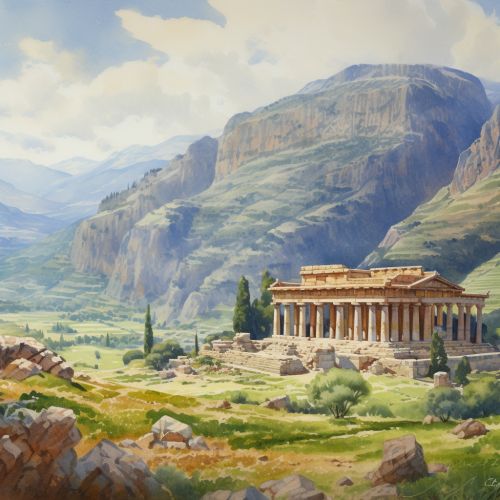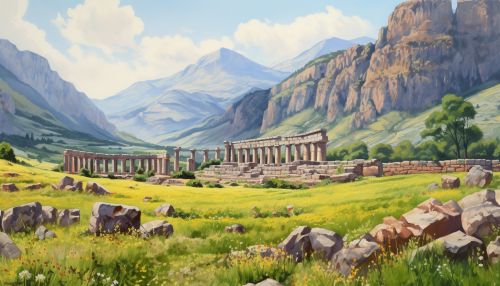Delphi
Origins and Historical Significance
Delphi, known in ancient times as Pytho, is an archaeological site and modern town in Greece on the south-western spur of Mount Parnassus in the valley of Phocis. Delphi was the site of the Delphic oracle, the most important oracle in the classical Greek world, and a major site for the worship of the god Apollo after he slew the Python, a deity who lived there and protected the navel of the Earth.


The Oracle of Delphi
The Oracle of Delphi was an institution in Ancient Greece, dedicated to the god Apollo. It played a significant role in Greek politics and religion. The oracle was considered the most powerful of all and was consulted before all major undertakings: wars, the founding of colonies, and so forth. She also was respected by Greeks and foreigners alike for her prophecies, which were considered the most accurate. The oracle was a woman of good character and known as the Pythia. She was required to be a woman of blameless life chosen from among the peasants of the area. The Pythia was not allowed to marry or have children.
The Temple of Apollo
The Temple of Apollo, the centerpiece of Delphi, was a peripteral Doric building, the latest of a series of temples built at the same site. The temple could accommodate a statue of Apollo, the treasuries showing the wealth of Apollo's devotees, and the Pythia, the oracle of Delphi. The temple was destroyed in 373 BC by an earthquake and was rebuilt for the third time in 330 BC.
Delphi in Mythology
In Greek mythology, Delphi was the site of the Delphic oracle, the most important oracle in the classical Greek world. According to Aeschylus in the prologue of the Eumenides, it had origins in prehistoric times and the worship of Gaea. In the last quarter of the 8th century BC there is a steady increase in artifacts found at the settlement site in Delphi, which was a new, post-Mycenaean settlement of the late 9th century. Pottery and bronze work as well as tripod dedications continue in a steady stream, in comparison to Olympia. Neither the range of objects nor the presence of prestigious dedications proves that Delphi was a focus of attention for a wide range of worshippers, but the large quantity of high value goods, found in no other mainland sanctuary, encourages that view.
The Pythian Games
The Pythian Games were one of the four Panhellenic Games of Ancient Greece, a forerunner of the modern Olympic Games, held every four years at the sanctuary of Apollo at Delphi. They were held in honour of Apollo two years after (and two years before) each Olympic Games, and between each Nemean and Isthmian Games. They were founded sometime in the 6th century BC, and, unlike the Olympic Games, also featured competitions for music and poetry, which pre-dated the athletic portion of the games.
The Site Today
Today, the site of Delphi is a popular tourist destination and is recognized by UNESCO as a World Heritage Site. The site is an extensive archaeological complex that includes the sanctuary of Apollo, the stadium, and the theatre. The museum onsite houses an impressive collection of artifacts from the site.
